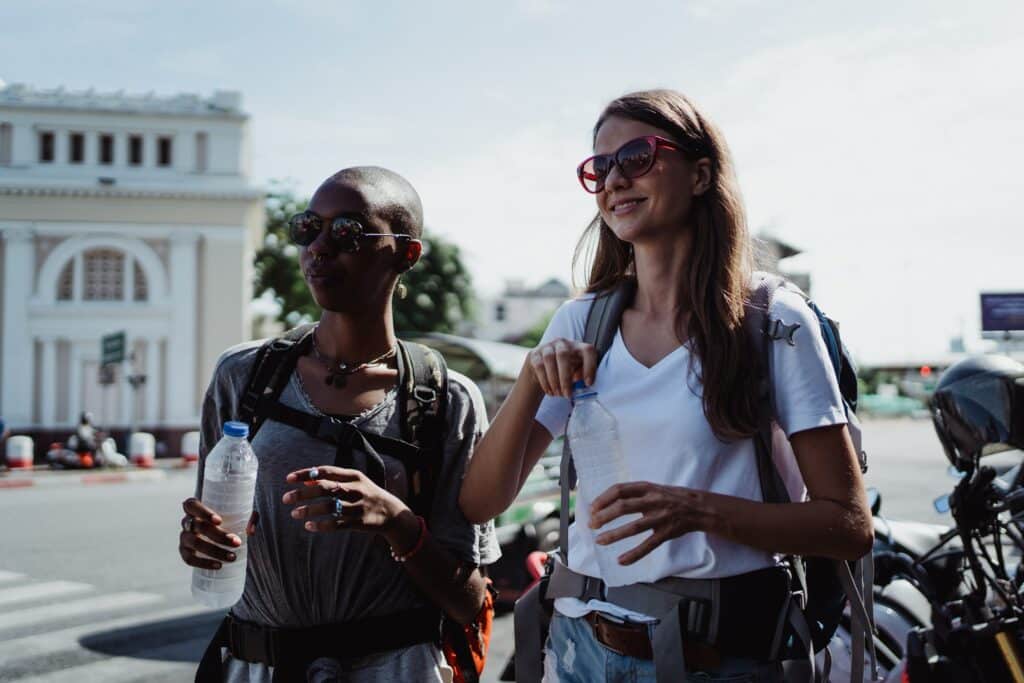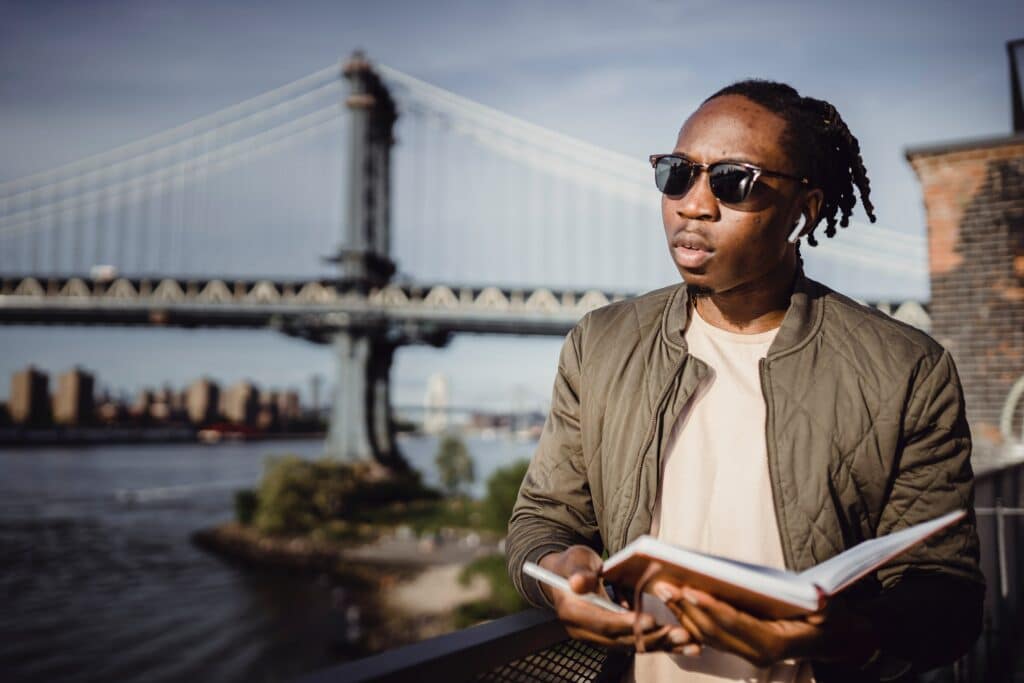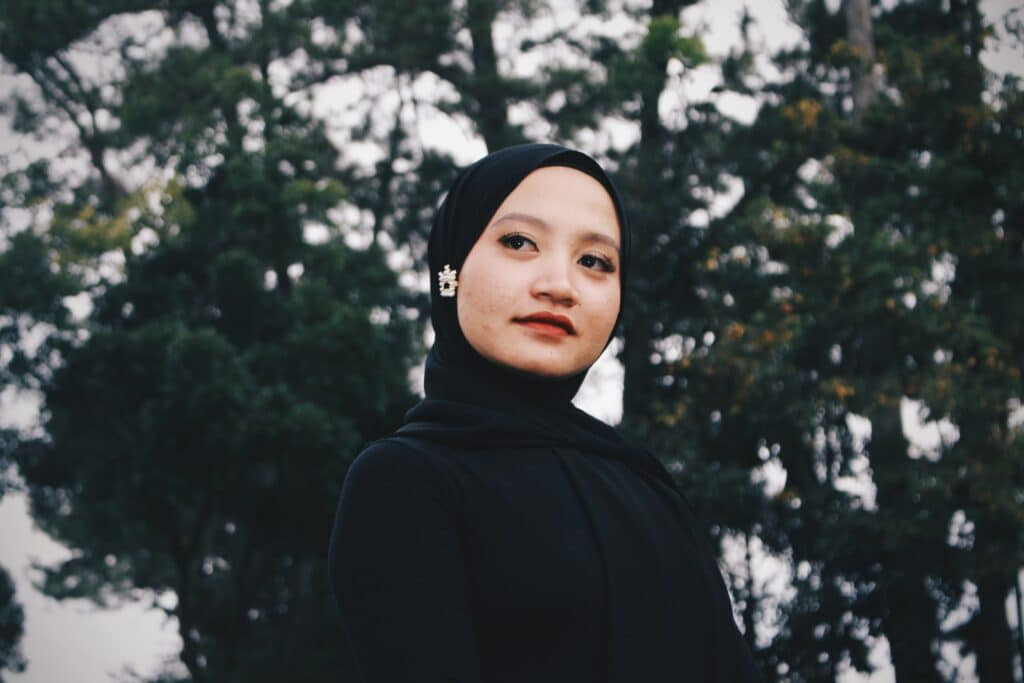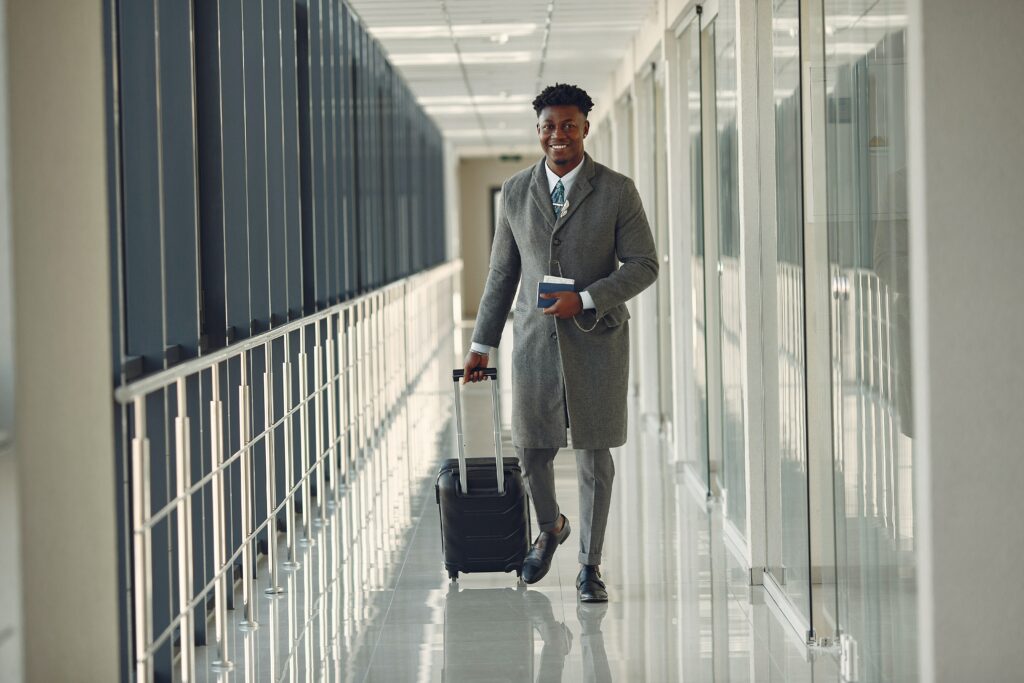Green Book Global: The Black Traveler’s TripAdvisor

Traveling is a fun and exciting experience. However, it can also be stressful and uncomfortable; especially for Black travelers because concerns over safety and racism have are considerations in the travel planning process. Questions about whether a destination, attraction or property would welcome or shun travelers of color is real. The good news is that there is a new resource for Black travelers to help ensure a safe and enjoyable holiday. Green Book Global is a site dedicated to helping Black travelers confidently explore the world by sharing travel tips and experiences from the Black perspective.
In this episode, we speak to Lawrence Phillips, founder and CEO of Green Book Global, which is on the mission to inspire and empower black travelers so they can travel the world in confidence. And his website has become one of the trusted sources that black travelers rely on, not just for every experience, but to learn about destinations from a safety standpoint, as well as have fun.
Tune in to learn more about Green Book Global, how it started, how it works, what they do, and how you can contribute to this platform and make a black traveler’s experience memorable!
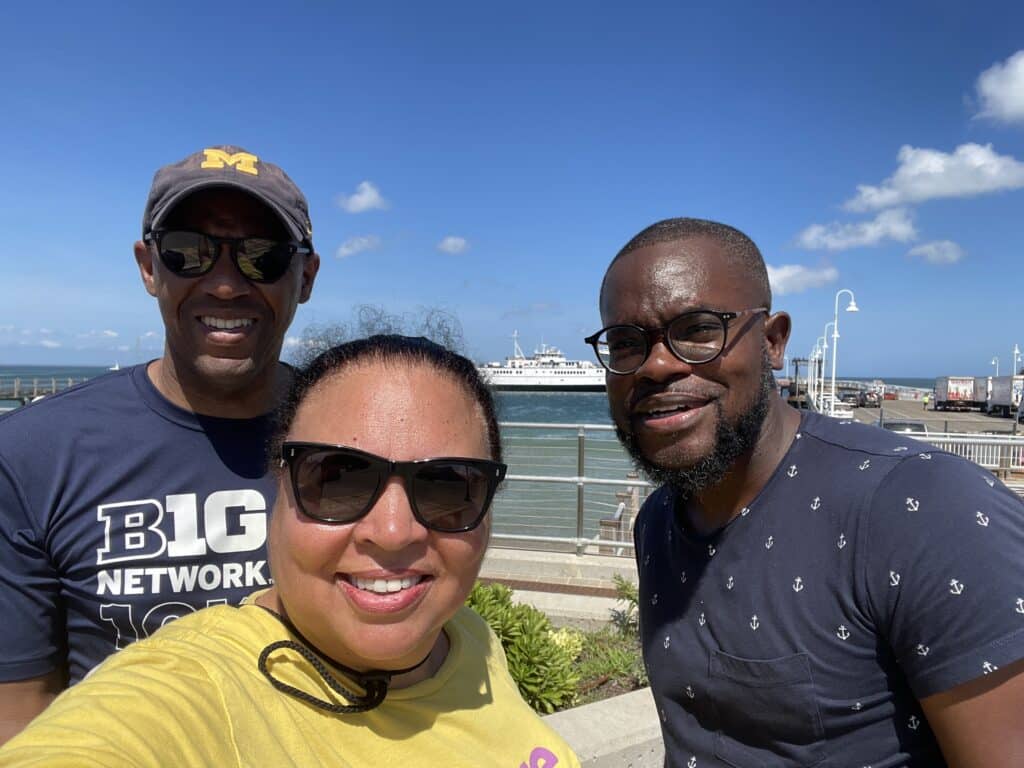
Key Highlights
[00:42] Introducing Lawrence and Green Book Global
[02:02] The special thing about Martha’s Vineyard and Oak Bluffs Beach
[03:17] Identifying the need for Green Book Global
[05:10] Naming the website after the original Negro Motorist Green Book
[06:25] Lawrence’s intention behind doing Green Book Global
[07:52] How he started Green Book Global
[08:51] How Green Book Global Works and how to contribute
[11:36] Moderating the reviews and preventing manipulation
[14:05] The importance of having information about a destination before traveling
[17:21] Sundown towns and how warnings are incorporated on the Green Book Global website
[20:56] Lawrence’s educational and travel background
[23:32] Prioritizing yourself
[24:24] Why does Lawrence travel and why is it important?
[25:23] What’s Lawrence’s soul country?
[28:08] Who would Lawrence pick, past or present, to travel to South Africa?
Notable Quotes
- We do things a little bit differently, where instead of just a listing of different restaurants and hotels, we actually review sites. So we have black travelers review their experiences and recommend things to do.
- The mission of Green Book global is to inspire and empower black travelers to competently explore the world.
- People have conscious and unconscious biases. And they, unfortunately, will treat you differently based on their own preconceived notions.
- We’re making sure that black travelers can enjoy their time, just like any other demographic wants to enjoy their time.
- Sundown towns were also places where they were made white on purpose. So they purposely would just drive out black people to the point where it was just a very white town.
- That was me choosing myself over a job. I was choosing me to be mentally happy, despite what the circumstances might be.
- Travel makes you aware of other cultures and other people and it makes you more of a global citizen.
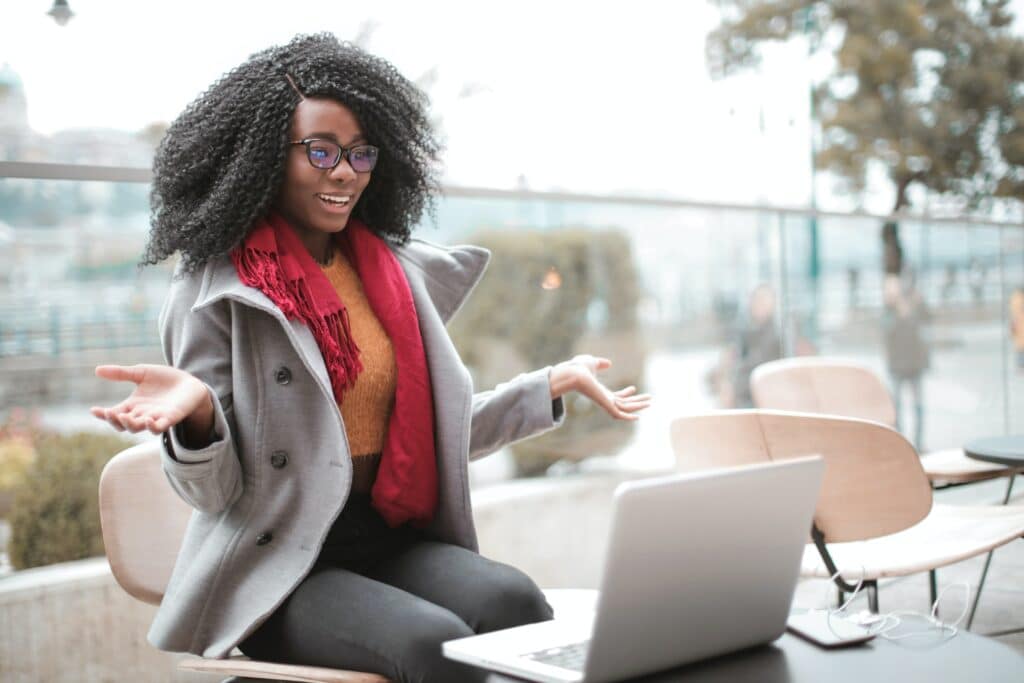
Resources
Green Book Global website: https://greenbookglobal.com/
Green Book Global on Instagram: https://www.instagram.com/greenbookglobal/
Support world footprints by leaving a five-star rating and review on APPLE PODCASTS here
Or your favorite podcast platform. This will help other like-minded and interested travelers find us.
Please join the World Footprints community by subscribing to our newsletter from https://worldfootprints.com/
FULL TRANSCRIPTS ARE AVAILABLE IN LINK BELOW
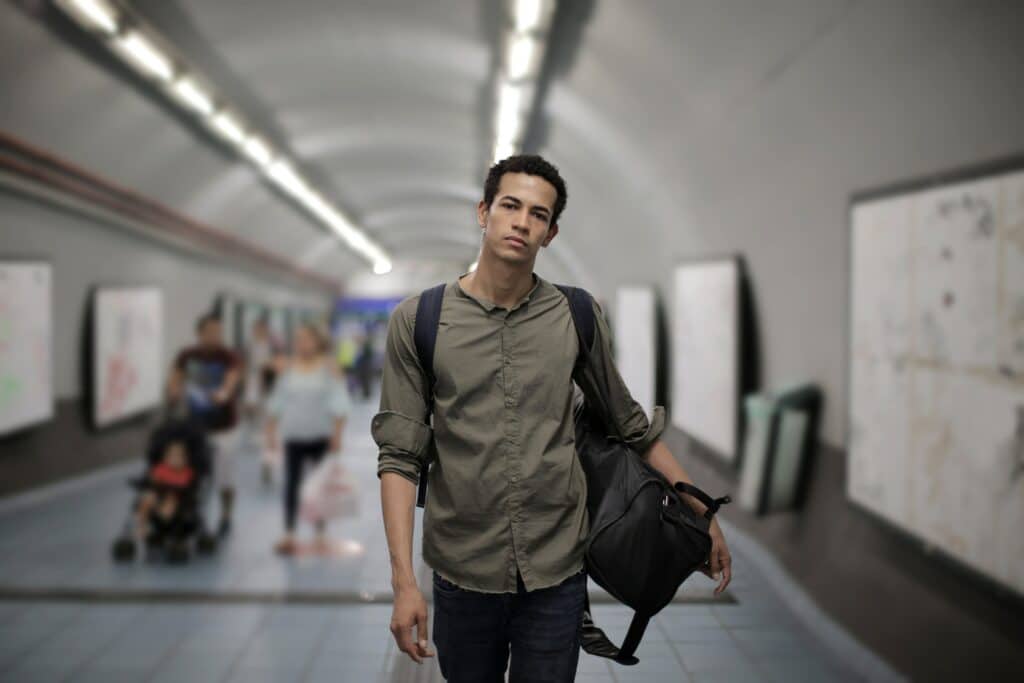
Book Your Travel To ANY Destination
Use the interactive map below to search, compare and book hotels & rentals at the best prices that are sourced from a variety of platforms including Booking.com, Hotels.com, Expedia, Vrbo and more. Search for ANY destination by clicking in the upper left corner of this map. You can also use the filter to fine tune your search, find restaurants, attractions and more!
Guests:
[00:00:07.630] – Lawrence
People have conscious and unconscious bias and they unfortunately will in times treat you differently based on their own preconceived notions. It won’t happen all the time, but it tends to happen, especially in this environment. It so it’s something that you can at least if I know that someone that looks like me went there and had a great time, I can at least rule something off. Okay, well, someone Black went there and it was good. Versus someone like that was rich or white, that was just white went there and it was okay.
[00:00:34.250] – Tonya
Welcome. I’m Tonya Fitzpatrick.
[00:00:36.690] – Ian
And I’m Ian Fitzpatrick. And this is World Footprints. That’s Lawrence Phillips, founder and CEO of the Green Book Global. Lawrence describes the mission of Green Book Global to inspire and empower Black travelers so they can confidently explore the world. And his website has become one of the trusted sources that Black travelers rely on, not just for every experience, but to learn about destinations from a safety standpoint as well as having fun.
[00:01:09.130] – Tonya
The Green Book Global is a website that helps make Black travel easy. It’s meant to inspire and empower Black travelers so that they can confidently explore the world. Similar to the original Negro Motorist green Book, first published in 1936, Green Book Global helps make travel easy and possible for the Black traveler, but on a global scale.
[00:01:34.790] – Ian
Lawrence. Welcome to World Footprints. We’re here in Oak Bluffs at the Oak Bluffs Beach. Just a few stones throw from The Inkwell here in Oak Bluffs. Truly one of our favorite places. One of your favorite places. I know we love coming here. Thank you for being with us.
[00:01:55.440] – Lawrence
No, thanks for having me. I’m glad the time it could work out that we’re actually here at the same time, so it makes this even better.
[00:02:00.460] – Ian
Absolutely. What is special about Martha’s Vineyard? Oak Bluff, The Inkwell for you.
[00:02:08.670] – Lawrence
So I think initially the history, just like this was part of the Underground Railroad. And just like this being one of the few places, I think in the US. Where professional upperly mobile Black African American people can come and socialize and just kind of be a lot of positivity in the air. In an environment where it’s so negative, you can kind of this is like a waste to kind of replenish yourself and pour back in to yourself. I also was married up here, so that’s a special place in my heart too. So I’m from Boston. I actually didn’t come up here to have much, but my wife did. And so we just kind of continue to come up here more and more and kind of just made sense to get married up here because she loves it. My family is really close by. I enjoy coming up here, so we had an amazing time when we got married in 2018.
[00:03:00.140] – Ian
There’s always something special about being married on an island Dear, isn’t there?
[00:03:04.690] – Tonya
You bet. Having been married on an island which island? Bermuda.
[00:03:11.930] – Lawrence
Okay.
[00:03:12.620] – Tonya
We may renew our vows here on Martha’s Vineyard.
[00:03:16.150] – Lawrence
Oh, awesome.
[00:03:17.690] – Tonya
I wanted to ask you about this website, Green Book Global. How did you identify the need for Green Book Global?
[00:03:25.980] – Lawrence
Yeah, definitely. So it all started long, long time ago. No, far Away galaxy. Far, far away. I was watching Star Wars the other day, so that’s why it’s in my mind. So in 2015, I quit my job to travel around the world. So I was working at Accenture. I did it for almost nine or ten years, and I was traveling back and forth between Atlanta and San Diego. So it was a great project. I got promoted on the project, but I was doing that commute every week. And so when I came back on Thursday or Friday, I was just a really angry Black man because I had to take that red eye. And then I’m just like, okay, I got to wash clothes. I got ready to do it again on Monday. So although it was really good, I got burnt out. And for a mental health standpoint, I was like, you know what? I need a break. So I was like, I love traveling. I’m going to travel. And so me and my buddy, we did a lot of traveling before he was my college roommate, we both were kind of on the same page.
[00:04:17.350] – Lawrence
And so Delta had an Around the World ticket where you can use your points to buy it. And it was expiring, like, the six months. And so the timing of me kind of burning out and the time we went and expired, or like, you know what? Let’s just do it. So we kind of split up in between it. But I traveled for about ten months, and I did 30 countries on all seven continents, including Antarctica, in less than a year. So pretty expensive, but it was well worth it. No regrets there. But that’s where I noticed a couple of things. One, it takes a really long time to plan for each destination, but then two, as a Black traveler, that’s where I got nervous, like, oh, I don’t know if I should go here, because I’m not really sure how it’d be well received. How would they take my Blacklist? And so that was kind of where that needs coming from, where I couldn’t find a platform that can provide that information. And so we have a tech background. Eventually started building it while we were traveling. It just kind of evolved year after year to what it is right now.
[00:05:10.890] – Tonya
You named your website after the original Green Book?
[00:05:14.020] – Lawrence
Yes. The original Negro Motorist Green Book. Yes. So that name actually took a bit. So I’ll be honest. Right. So initially I was marketing to young professionals, and I used to call it You Work to Travel, because I was like, okay, let me try to find a demographic that’s unique. But then I just I’m Black. I speak Black. I love Black. I talk Black. I’m just Black. So I was just attracting more and more Black people to be followers, to be part of the platform. So I was like, well, let me just double down and just keep it what I wanted to be anyways. And so that’s where I kind of renamed it as Green Book Global. So paying homage to the original Negro Motorist Green Book, victor Hugo Green was a postman back in the 1930s that started the travel guide for Black travelers that essentially helped them during Jim Crow and segregation to navigate really, the US safely, to find, like, restaurants, hotels, gas stations that will serve them, also help them avoid towns, sundown towns, where there could be dangerous things would happen to a Black person at night when the sun goes down.
[00:06:08.950] – Lawrence
So we definitely wanted to pay homage to that. But we do things a little bit differently where instead of just like a listing of different restaurants and hotels, we actually are a review site. So we let Black travelers review their experiences and recommend things to do, but also what their travelling while Black experience actually is.
[00:06:25.730] – Ian
What was your intention behind doing Green Book Global?
[00:06:31.010] – Lawrence
Good question. It was just to make life easier for people that would be in the same position I was in when I was traveling. So I’ll give you a good example. So part of that trip, I was in Paris, and I went to a hostel and was talking to a young Black woman there and mentioned that chocolate. I love chocolate. And she’s like, oh, you should go to Belgium. And I was like, whoa, at that point, I never even heard of Belgium. Like, what’s a Belgium? And she’s like, oh, it’s a place where if you love chocolate, that’d be a really great place to go. I was like, is it safe for Black people there? And she gave me the co-sign that said it was safe for Black people. And that’s when I was like, okay, I’ll go. And so the next day, I actually went to Brussels, and I spent about a few days there just getting tons of chocolate, which was great, but I needed that kind of confirmation from another person that looked like me. And so that was the intent. When you have that need and you don’t have a person that you can contact, what do you do?
[00:07:23.770] – Lawrence
You may not go. I wouldn’t have gone if I didn’t see right into her. I’m only going to places I know. But if you don’t have a person that can give you a personal recommendation or a reference, we want to be that platform that allows you to do so. And then also, even if you have one person, we give you plenty. We give you hundreds of thousands of Black people that have been to these places. So you can kind of assess your own from your own perspective, your own views of what their experiences were and then decide upon yourself to either take that journey or not. Really, information is safe and we want to give you the information.
[00:07:52.710] – Tonya
When did you start Green Book Global, and how many different iterations of the website did you go through?
[00:07:58.860] – Lawrence
So started the idea started in 2015. It crashed so many different times. It got rebuilt so many different times. So 2018 is what the version of the website that you see right now is. So currently we have over probably 5500 travel tips from Black travelers from all over the world for probably about four to 500 destinations. So some of them have like upwards of 200 reviews for certain cities and islands in the world.
[00:08:26.200] – Tonya
I noticed that there was no entry for Martha’s Vineyard.
[00:08:29.390] – Lawrence
There wasn’t? Yes. So there are some cities that I don’t put on there because sometimes I try to make partnerships there, but Martha’s Vineyard is something that’s on the list. So I actually am doing some content that did a lobster crawl last time I was here. So I want to post that, maybe add a Martha’s Vineyard listing and see what I can do to get more kind of publicity for it from a Black perspective on the platform.
[00:08:51.200] – Ian
So explain how Green Book Global works in terms of how a contributor or someone who leaves a review and how you bring together this community around travel. You’ve got suppliers represented as well. Give us a sense of how it works.
[00:09:08.850] – Lawrence
Yes, definitely. So the mission of Green Book Global is to inspire and empower Black travelers to competently explore the world. So the inspiration comes from our Instagram page where we have over 100,000 followers on IG, and we repost Black travelers showing, hey, we’re everywhere. Don’t be nervous, get out there. The empowerment comes from the platform itself, which is where we have the reviews. So what you can do, you can find a review can type in. So we have a couple of ways you can do it. If you know where you want to go, you can type in the city. You want to go to Bali, you want to go to Austin, Texas, you want to go to Okinawa, Japan. You can type it in. And there’s typically a listing there for some of the most popular cities, and that city will come back. And what we do differently is you score them on a destination level. Each city has a category and a score for things to do adventure, romance, relaxation, affordability, history, nightlife, local food, and traveling while Black. So each of these have a five star score that users leave reviews for. So once you finish your trip well, actually, if they’re going on your trip, you read all these reviews and you can see it by different categories, which ones may be more applicable to you.
[00:10:07.950] – Lawrence
So I’m going with my wife. I might look for more of a romantic under romance section. I want to see like what’s out there? Relaxing. She needs to relax. Local food. She likes to eat, and I like to eat too. So you can actually find the comments there, and then that’s how you can find the information. What we also do is to kind of give more an incentive is we started a Passport Membership, and what this is, is kind of an elevated membership. So if you leave reviews on the platform and you’re a Passport member, you’re actually going to earn cash. And so that’s something that’s different from all the other review sites out there, like the Yelp, TripAdvisor, those are great, but we’re like, people leave reviews on those platforms. Those companies make a ton of money off those reviews, and the user really doesn’t get anything back other than a badge. Right. So we’re like, you know what, why not share the wealth so you can actually earn cash for leading reviews on our website? And on top of that, as you say, we have suppliers. So the next step after you read reviews is you want to book.
[00:10:55.780] – Lawrence
We have suppliers like Expedia, Booking.com, even TripAdvisor on there as well. So once you read reviews, you get comfortable with the destination during the Black perspective. You can then book from our platform. So you actually will start the booking with Expedia on our platform. Start the booking with Booking.com on our platform, and we take you to their own website, where you kind of finish your checkout experience. But we get a commission that way. And if you’re a Passport Member, you’ve actually shared that commission with you. So it’s a way that you can literally do exactly what you’re doing right now, use Expedia, Booking.com, even Marriott, and earn cash. And there’s no other way you can do that right now.
[00:11:30.380] – Tonya
Wow.
[00:11:32.450] – Ian
Absolutely. And speaking of these reviews, what are the guidelines for the reviews? Are you looking specifically for certain things that speak to the African American traveler when they travel to particular destinations? What sorts of basic guidelines do you have for reviews that are basically contributed by travelers?
[00:11:58.210] – Lawrence
Yeah, so we have an FAQ section that actually outlines how you should score each category. So, for example, traveling while Black, if you had an amazing time, it feels like, what kind of became real all of a sudden? Right. You give it a five star scale, a five star rating. But if it was something that was, you experienced racism, just problems, maybe with the police or something like that, then you kind of want to rate it on that level, like a one star. So we give them that flexibility. But the idea is for them just to be their authentic self. So I don’t want you to hide anything. I want it just to be completely authentic. We have to personally kind of approve each review, too. So if you see, like, a one liner, that’s not really that value, but we want to prove it so that’s why we kind of monitor the value and the kind of elements of the reviews that are putting on the platform, because each one I literally go through at least myself right now to make sure, okay, this is what we want to be on the platform.
[00:12:49.560] – Tonya
There are other review sites. We know which ones they are, and many of them have planted reviews from competitors who are trying to disparage a website by planting negative reviews and from the organizations or companies themselves who plant positive reviews in order to build up their ratings. So how do you try to avoid that type of manipulation? And how do you actually vet new entries that you receive? New reviews that you receive?
[00:13:23.130] – Lawrence
Yeah, so what’s interesting is the way we’ve organized the platform. We really don’t run into that problem because the goal isn’t to review a specific hotel or specific activity. It’s to review your overall experience and a destination. And so we have, like, a where to stay section where you might actually talk about where to stay and how it was, but you’re not reviewing them, reviewing how was it in general to stay in Martha’s Vineyard? Right. Or how was it in general with the food in Martha’s Vineyard? And then if you want to call it a specific restaurant, then it’s up to that person to do some additional research. But that way we don’t get into the kind of the problem of, like, someone talking good about this restaurant, bad about this restaurant, and trying to compete because you’re really giving an overall view of a destination. So we kind of are able to not even have to necessarily have that as a problem.
[00:14:05.630] – Ian
Safety and comfort is an important consideration to all travelers, but especially for people of color and we’ve had an experience too where we’ve traveled to destinations and we’ve read reviews, and we’ve seen some unpleasant things about them, and that did determine whether or not we stayed at a particular place. So in terms of people who are not familiar with this important need, specifically in our community, talk about that, why is it important, you think, to travelers, especially travelers of color and conscience, as I like to say, that they have this information? Because personally, I don’t like to spend my money with organizations and businesses that don’t welcome me.
[00:14:56.130] – Lawrence
Absolutely. So we actually got featured in Travel Noire this past week. Thank you. And one of the things that I mention in the interview is that one of the questions, like, why do you need something more than TripAdvisor? Right. And it’s because reviews don’t reflect your demographic. So people have conscious and unconscious bias, and they, unfortunately, will at times treat you differently based on their own preconceived notions. It won’t happen all the time, but it tends to happen, especially in this environment. Right. So it’s something that you can at least if I know that someone that looks like me went there and had a great time. I can at least rule something off to us. Okay, well, someone Black went there, and that was good, versus someone white that was rich or white that was just white went there, and it was okay. So it kind of just alleviates some of the concerns that you could maybe run into because you want to travel and have a great time. That’s the ultimate goal. And so we’re making sure that Black travelers can enjoy their time just like any other demographic wants to enjoy their time.
[00:15:54.470] – Lawrence
What we also do as well is we also have a search tool that helps you find destinations based off those scores. So, if you think about the Green book, the original Green Book, right, in the 1930s, is that it really help you navigate certain towns based off of if we’re safe or not. So we can kind of do the same thing with our travel. But, again, it’s kind of a modern twist. So, again, it’s a five star scale. So I can pick Europe. I can say I want a destination that’s 4.8 out of five for traveling while Black, and that would be the top rated destinations for traveling while Black in Europe. Or you can say, I am going to some places. Let me kind of rule out a lot of these places. It’d be less than four I don’t want to go to. So you can kind of identify different cities based on that travelling while Black score and that tool as well. Again, trying to make sure you have a great time when you’re enjoying your vacation or going on a trip.
[00:16:46.130] – Male Announcer
You’re listening to the award winning World Footprints podcast with Ian and Tonya Fitzpatrick. World Footprints connects you to the world through powerful storytelling that illuminates our common humanity and uncovers the full narrative of our cultural and human experiences. Support World Footprints by leaving a five star rating and review on Apple Podcasts or your favorite podcast platform. This will help other like-minded and interested travelers find us. Also, please join the World Footprints community by subscribing to our newsletter from worldfootprints.com.
[00:17:21.590] – Tonya
Lawrence, you previously mentioned sundown town. You gave a brief history about them, but talk about how you incorporated that type of warning into your Green Book Global site.
[00:17:36.410] – Lawrence
Yeah, so Sundown towns are essentially towns I would say from 1930s, but kind of like they’re still kind of relevant right now, unfortunately. But there were towns where Black people weren’t safe necessarily when they got to be at night, so they might go there for work. But the town said, you have to get out by the end of night or you’re not wanted here, and bad things can happen. Sundown towns were also places where they were made white on purpose, so they purposely would just drive out Black people to the point where it was just a very white town. And again, I was very much intentional because I think sometimes sundown towns can get kind of misconstrued because there’s one where it’s dangerous, right? And that’s something that like, Vidor, Texas. I’ll talk about that one maybe in a second, but where it could be potentially dangerous. But also, it’s just white historically, because they decided that Black people weren’t welcome there. And so those are kind of two different, I guess you say, segments of sundown town on a high level.
[00:18:29.670] – Tonya
These are people in the service industry, though, right?
[00:18:32.520] – Lawrence
Right, yeah. They would come there. So, like, the Vidor, Texas one, this guy, he was right in the truck, and I think he was delivering something in the service industry, and the guy is like, hey, you should probably get out of here before it gets too late. And this is like two months ago. This wasn’t awhile ago. This was like two months ago. And so because of that, I started actually putting sundown towns on the platform and also doing more research about sundown towns and doing more articles about them, because, again, I was a little naive. I was like, oh, no, they can’t still be sundown town here, and they can’t be that relevant. And unfortunately, that’s not necessarily the case.
[00:19:11.430] – Ian
I’m sure it would shock listeners, some listeners, to know that in this day and age we still have that, and that there are places that are actually pushing themselves out to the world as you can’t come here because of your skin color. It’s just an offensive notion. As offensive as it used to be and still is to this day, I just can’t wrap my head around that.
[00:19:41.610] – Lawrence
Right. Been raised to the surface. This one isn’t a sundown town per se, but it’s a restaurant that I got wind of in Georgia. And this is the crazy thing, too. All these places are like 45 minutes from the main city, so it’s not even like it’s like somewhere in the middle of nowhere. It’s like, oh, you could literally drive to this place. But there’s a restaurant I forget the name. I don’t even want to give the restaurant even publicity, if I remember the name anyways. But it literally had and I did some research on it, I think two Black people on the restaurant menu with being lynched. They had them with the rope, the noose around their neck on the restaurant cover. This restaurant is still in operation today. Like, right now, you could go there 45 minutes from Atlanta. It had all these Confederate flags. It had all, like, KKK hood. I had a lot of stuff in the restaurants, in this particular restaurant, and that’s just when I got wind of, right? So again, you start to hear and see more of this. You’re like, this is really why it’s necessary. Because we have to be safe when we travel, because the people that go there, you might be interacting with.
[00:20:49.220] – Lawrence
So you at least want to make sure, oh, shoot. If I know I’m in this area. Let me be a little bit more careful. Maybe nothing will happen, but you want to make sure nothing happens.
[00:20:56.670] – Ian
Lawrence, you mentioned at the outset you grew up in Boston and you’ve become a world traveler. Give us a sense of your educational background and whether or not you traveled a lot as a kid and how that travel bug bit you.
[00:21:12.310] – Lawrence
Yeah, so my family is from Barbados, so every once in a while you might hear a Bajan accent come out from time to time. So I used to go back and forth between Barbados and Boston a lot. So that was a lot of my travel. And then once I went to high school in Boston, I went to college at Georgia Tech in Atlanta. And so me and my college roommate, we both had a passion for travel. So I think my first trip outside of Barbados that I can remember, it was like I’m a young adult. I did a cruise to the Bahamas for like, three days, have my own room. I was like, I was on top of the world. And I was like, yes, I’m traveling. But then we started going like, Costa Rica. I started going to different parts of South America. Central America. So it really started when I was younger. But I also will say as part of this program called Summer Search, and honestly, I love this program because it changed my life, literally. But it takes kind of put it simply at risk kids. We were inner city kids.
[00:22:06.470] – Lawrence
It’s like, hey, we want to expose you to the outdoors. So I actually did a trip to Washington State when I was like, 14, and I traveled. I hiked for like a month straight. Remember, I’m a city boy. I don’t hike. I never hiked a day in my life. I’m a city boy. I like concrete. But I was in the woods for literally a month, and so that really kind of got my confidence up and kind of really helped me develop. I’m a man. I can do this. If I can hang on the woods, I can do college, I can do school. So it really gave me that booster of confidence.
[00:22:34.830] – Tonya
Would you say that’s probably your most transformative travel experience to date?
[00:22:39.710] – Lawrence
I would say it’s one of them, because I think as a young man, that really made me hone into confidence. And I think as a young Black man growing up in Boston and all the things you hear about what you can and cannot be, I think that just said, that doesn’t apply to me because look what I just did. I just hiked 90 plus miles with 100 pound backpack, and I cooked blueberries after I picked them off the trail that we did one day. And it actually tasted good. I got us lost by a raging river. So it kind of humbled me too. So it was a lot of different life lessons that I got really condensed in that one month. And then the great thing about that program, it makes you kind of like, right about your experience. And so it made me kind of pick apart what that really was like, and so I made sure I got all the value out of that experience. So I would say that’s definitely one of the most transformative, and I would say my round the world trip would be available, too, because that was me choosing myself over a job.
[00:23:36.090] – Lawrence
It was choosing me to be mentally happy despite what the circumstances might be when I come back.
[00:23:43.230] – Tonya
Ooh. Repeat that again, because I certainly want to hear it, and I think many of our audience members would want to hear that also.
[00:23:51.710] – Lawrence
Probably. I could never say whatever I said twice again, but I’ll try.
[00:23:54.390] – Tonya
You chose you.
[00:23:55.940] – Lawrence
Yeah, I chose me. I chose me. And I think that’s the part where and that’s what I was kind of going back and forth with. It’s like, oh, should I do it? Like I have a job. I have a girlfriend who’s now my wife, so I still worked out. I have all this responsibility. I have a house. I got a mortgage. But I’m tired. I’m really tired. And I feel like this is going to be for me, and I think I need this for myself. I’m going to choose me and see what happens.
[00:24:21.620] – Tonya
Excellent. Excellent.
[00:24:23.580] – Ian
Without beating a dead horse too much, but again, we travel for a living. We’ve incorporated it into our work and our lifestyle. Why do you travel, and why is it important to you beyond just what you’re doing entrepreneurially?
[00:24:41.860] – Lawrence
So travel, I think, makes you aware of other cultures, of other people, and it makes you more of a global citizen, I would say. I remember I talked about that story in Brussels, right? I think they had a bombing there maybe a few years ago. And so to me, that meant a lot more because I was actually in Brussels. I remember I had a guy that took me on a bar crawl. I was like, oh, I texted him and say, hey, how is everything going? So when you travel and you’ve been to places, when anything happens, you have a more authentic connection, so you actually legitimately are concerned versus just kind of going and switching to the next channel, right? So I think not only does it help me pour back into myself, but it also makes me care more about other people.
[00:25:23.580] – Tonya
You know, I always say you never go to war with the people you break bread with. So really, that’s what travel does. It builds a bridge that really brings together and fills in the cultural gap. It allows people to crossover other cultures and really experience them with, hopefully, an open mindset and open eyes, open hearts. But it really shows us that we’re all interconnected. In all your travels, is there a country that has really touched you, one that’s really resonated with you? I call that your soul country.
[00:26:03.410] – Lawrence
Ooh. My soul country. Ooh. Okay, that’s a new one.
[00:26:07.860] – Tonya
I’m actually going to trademark that.
[00:26:09.490] – Lawrence
There you go. My soul country. So I always say this one, but I think I never thought about it as my soul country, but it might be my sole country. Okay, so I was in Johannesburg.
[00:26:21.130] – Ian
South Africa.
[00:26:22.240] – Lawrence
Yeah. Okay, so the reason why is because I went to South Africa twice so far. The very first time, I went to Joburg and I went on a safari. But when I was in Johannesburg, I was shook. I was freaking out. I was like, oh, my gosh, I can’t be in Joburg. It’s dangerous. I can’t do anything. I went to Sandton Mall and came back home, and that was it. Because I was so nervous about what the media told me to do or told me about the destination. So I’m doing literally what I tell people not to do. But at that point, I was like, what am I supposed to do? This is all I can hear. But so when I went back on that round the world trip, I spent about two weeks in Johannesburg, and I got such a great connection with some of the people there. It was absolutely amazing. And I always tell this story where I think I was on a plane headed to Johannesburg.
[00:27:06.130] – Lawrence
I think I did a Facebook message and said, hey, I’m going to Joburg. And one of my even like, he’s not even a friend. It’s just someone that I knew, I ran into said, hey, I got some people out there that you can meet. Okay, cool. Met the people at the bar. We hung out to, like, two or three o’clock in the morning, and it was guys and some lip and girls, too. And then when we left, one of the guys was like, listen, text me when you get home. And I was like, bro, I just met you. I’m not even cool with you. Like that. What do you mean, texting when I get home? I’m not a woman. What’s going on here? Yeah. And I’m just like, no, I’m good. He’s like, no, you’re in my town, right? I’m looking out for you. I want to make sure that you are good. And so this is how we do in Johannesburg. And I was like, oh, wow. And that really hit me because another man showing that love to another man that you barely even know, it just kind of shook my reality. And I was like, wow.
[00:28:00.050] – Lawrence
Okay, let me look at things a little differently now. And so that was kind of the shift. That’s why I say it was my soul country. Yeah.
[00:28:08.950] – Tonya
So if you were to pick anyone, past or present to sit next to on a long haul flight to your soul country, who would that be and why?
[00:28:22.510] – Lawrence
You just added some layers to it.
[00:28:24.230] – Tonya
It could be anybody, past or present.
[00:28:28.030] – Lawrence
I mean, what’s top of mind because of Martha’s Vineyard? And you said anybody. I’ll go with Barack. Shoot. Yeah. I can sit next to Barack as we go to South Africa. Yeah. Because, one, I’ve been there a couple of times. I don’t know if he’s been, but I could tell him a little thing or two about it. But I think it would just be interesting to be on that long haul flight and to kind of not pick his brain, but just kind of break bread with him just to understand more about who he is because we can see who he is on the limelight of, like, who he really is. Right. So I feel like those types of conversations are more authentic and real, so I look forward to a conversation like that. So, Barack, if you’re listening…
[00:29:07.470] – Tonya
He is. He follows us.
[00:29:08.030] – Lawrence
I know you somewhere in Martha’s Vineyard, brother.
[00:29:10.270] – Ian
We won’t say where.
[00:29:15.050] – Tonya
Laurence, I’m so glad we were able to talk to you. One of our favorite places that water is calling my toes right now because it’s a little bit hot and I need to cool down. I know we all do, but we thank you so much for spending this time with us here.
[00:29:30.380] – Lawrence
Thank you so much for having me. It was a great opportunity just to get to see you and Martha’s Vineyard, to connect again. Like you said, breaking bread with you. So I love it.
[00:29:46.530] – Tonya
Well, first Dear, I’m so happy that we can be in one of our happy places here on Martha’s Vineyard and connect with a friend who we recently saw in Miami. But to talk about the importance of having a mechanism, a platform for the Black traveler to go. And it’s funny that we’re here in Martha’s Vineyard during a month when the island has a lot of Black travelers from around the world really come in for various events, from the African American Film Festival to the Fraternity Week to a lot of just different events for people like us.
[00:30:34.060] – Ian
Yeah, African Americans feel comfortable in Martha’s Vineyard, and that’s one reason why they come, as Lawrence had to refer to sundown towns, unfortunately, they still exist. This is one place where African Americans do come, spend their money and make a significant impact. If it weren’t for African Americans coming here, owning properties, Martha’s Vineyard would be an entirely different place and it would have an entirely different vibe.
[00:31:05.430] – Tonya
I wonder if there are any sundown towns here. We didn’t ask him that, so be worth looking into.
[00:31:10.780] – Ian
Yeah, we’ll explore that later, I’m certain, because Lawrence is such a powerful person in this space and he’s doing a lot of interesting things.
[00:31:23.230] – Tonya
Yes, it’s good information. It’s certainly a place or a website we could have used when we did a camping trip a few years ago in Virginia and came upon a campground that I really wanted to stay at because it was waterfront, first of all, but it was very uncomfortable when we saw certain flags, Confederate flags, flying and flying without any type of limitations. So I know that was a particular campground that allowed that type of negative imagery to be seen, whereas where we stayed, it was barred. That type of negative stuff was barred.
[00:32:04.060] – Ian
So, sadly, you kind of appreciate why we need Green Book Global, even in this day and age.
[00:32:11.900] – Tonya
Yeah, for sure. In closing, let’s consider the powerful words of Mae West: “You only live once, but if you do it right, once is enough.” We’re Tonya and Ian Fitzpatrick, and we’re so happy that you’re here. It would mean a lot if you could leave us a five star rating and review on Apple Podcasts or wherever you listen to podcasts.
[00:32:36.730] – Ian
We’d love for you to join our community, so please subscribe to our bi-weekly newsletter from our website at worldfootprints.com. Our newsletter is full of travel news, tips and resources, including our favorite links.
[00:32:52.120] – Tonya
Thank you so much for your support and for giving us the space to share the world through the stories we offer on World Footprints. Until next time. Remember, a smile is a universal sign of kindness, so don’t be shy. Smile.
[00:33:10.890] – Female Announcer
This World Footprints podcast with Ian and Tonya Fitzpatrick is a production of World Footprints, LLC. Silver Spring, Maryland. The multi-award winning podcast is available on Worldfootprints.com and on audio platforms worldwide, including iHeartRadio, Public Radio Exchange, iTunes, and Stitcher. Connect with the world one story at a time with World Footprints. Visit worldfootprints.com to enjoy more podcasts and explore hundreds of articles from international travel writers. And be sure to subscribe to the newsletter. World Footprints is a trademark of World Footprints, LLC, which retains all rights to the World Footprints portfolio, including Worldfootprints.com and this podcast.
